EI Innovate: Why is knowledge exchange important?
After our inaugural EI Innovate event, we reflect on its success, and why knowledge exchange is so important. Save the date now for 2020’s event!
Engaging researchers with the end point of their research is of vital importance if we are to reap the benefits of scientific discoveries.
The main funders of research increasingly seek to understand how the investment they make into science benefits society as a whole, especially when it comes to improving the economy, public health, or addressing the issues associated with climate change.
That’s why last year EI held its first externally facing event, EI Innovate, to bring together various stakeholders and showcase how EI expertise can add value to their projects, as well as opening opportunities for collaboration and innovation.
82 people came along to our inaugural EI Innovate event, among whom were 35 representatives from industry and other stakeholders, and 14 representatives from fellow academic institutions.
We were delighted to welcome many of our collaborators and partners, including the Natural History Museum, Royal Botanic Gardens Kew, University of East Anglia, Quadram Institute Biosciences, and companies across the agri-food, biotech and life sciences sectors.
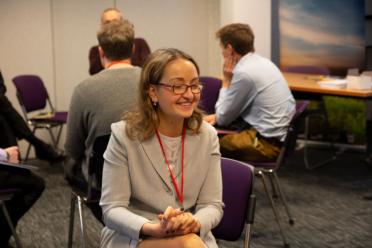
EI Innovate was hosted by our Head of Business Development & Innovation, Liliya Serazetdinova, who is passionate about knowledge exchange between academia and industry, which is important for both parties.
For scientists, knowledge exchange adds value to your professional development and helps you to develop new collaborations and partnerships. It enables you to access new datasets, expertise, or equipment that would be either impossible or very expensive to obtain for yourself.
Knowledge exchange allows you to work with non-academic experts who have different working methods and ways of looking at research problems. Furthermore, it can open up a range of new funding opportunities, increases the impact of your research, and opens the door to creating spin-out companies and developing new industrial partnerships.
For businesses, knowledge exchange provides a formal platform by which industry can get access to some of the breakthrough, blue sky science research that happens at institutes such as EI. Many major breakthroughs have been made possible in the academic sector due to the breadth and depth of research being undertaken across the spectrum of what’s possible to investigate.
Institutes such as EI are hotbeds of innovation due to the multidisciplinary nature of their research. Many of the most important discoveries have been made when researchers worked across disciplines and used diverse thinking to solve multifaceted problems. Industry can help academic scientists realise the potential of those breakthroughs, and add another dimension to how we approach complex problems and the methods by which we break them down.
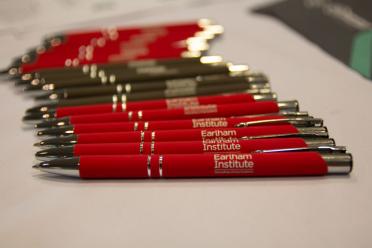

For businesses, knowledge exchange provides a formal platform by which industry can get access to some of the breakthrough, blue sky science research that happens at institutes such as EI.

EI provides solutions to industrial challenges in ensuring food safety and security, improving human, animal and plant health, and in aiding conservation.
EI’s socio-economic impact assessment in 2018 estimated that the Institute's return on investment is £14.77 for every £1 invested, with its operating impact at £10.3m GVA (gross value added) to the UK economy per year. The overall potential impact of EI’s business development on the UK economy was estimated at £235m over the next 25 years.
Standout projects include a multidisciplinary approach to tackling salmonella and multi-drug resistance through combining experimental and computational biology approaches. Work in sub-Saharan Africa is providing assistance to local communities increasingly looking to aquaculture to provide important calories and socio-economic wellbeing.
Our capacity building work in Colombia and East Africa is providing researchers with the skills they need to flourish, along with new applications of research cyberinfrastructure, as well as greater opportunities for UK research and innovation on a global level.
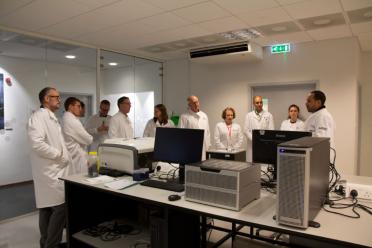

EI’s socio-economic impact assessment in 2018 estimated that the Institute's return on investment is £14.77 for every £1 invested, and an overall potential impact for EI's business development on the UK economy estimated at £235m over the next 25 years.

We received a lot of positive feedback from attendees both informally and via a feedback survey, with participants commenting that the event provided a fantastic opportunity to learn how EI collaborates with other businesses on the Norwich Research Park, as well as organisations across the globe.
The audience particularly valued the talks showcasing some of the pioneering work taking place at EI, covering a broad range of disciplines from plant biology to conservation genomics; exciting for generating and discussing ideas for future techniques on collaborative projects.
Just some of the topics covered in the talks included examples of innovation in exploring biodiversity; developing patient-specific treatment strategies for IBD; bio manufacturing; exploring genetic variation in crops using genomics and phenotyping; developing tools to analyse the genetic material of individual cells; and reliably identifying potentially pathogenic taxa along with corresponding antibiotic resistance gene profiles in as little as one hour.
The event also featured 3 high profile external speakers; Dr Tim Littlewood, Director of Research at the Natural History Museum; Professor Alexandre Antonelli, Director of Science, Royal Botanic Gardens Kew; and Dr. Daniel Turner, Vice President for Applications, Oxford Nanopore, who announced their new Pore-C assay at the event.
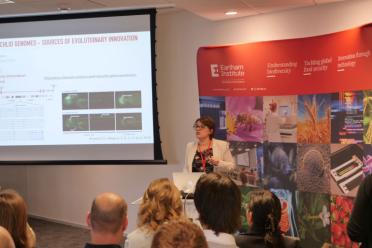

The audience particularly valued the talks showcasing some of the pioneering work taking place at EI, covering a broad range of disciplines from plant biology to conservation genomics; exciting for generating and discussing ideas for future techniques on collaborative projects.

The afternoon programme had three breakout sessions, which were particularly valued by attendees, as it enabled them to find out a bit more about specific areas of EI’s work, and discuss potential ideas for collaboration.
A breakout session on Frontiers in Next-Generation Sequencing led by Dr Karim Gharbi explored applications of mobile sequencing, techniques identifying DNA/RNA modifications, and spatial transcriptomics. The group discussed ideas of using mobile sequencing for soil health monitoring, water quality monitoring, or checking food authenticity.
Dr Nicola Patron and Dr Wilfried Haerty led a discussion around the challenges of data generation, curation and storage coming from large genome sequencing initiatives such as the Darwin Tree of Life project. Participants discussed the huge value of the data coming out of this initiative, and the importance of making it accessible to the bioscience community to open up greater possibilities for research, discovery and innovation.
Science produces lots of data, and the rate of data generation is increasing with new platforms, new tools and new devices. Therefore, in the remaining session Dr Rob Davey explored data generation within scientific research along with the technological progress that enables it. The group explored the computational needs and challenges of organisations, and discussed various computational approaches - from decision support tools for farmers to improve harvest management to the analysis of complex interactions in the human gut microbiome.
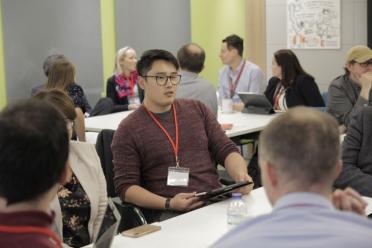
This was the first event of its type that EI has held to engage with external stakeholders, current collaborators and prospective partners. We wanted to showcase the breadth of our expertise and capabilities and we were delighted with the interest and attendance – it was great to see how we can further work with industry and other stakeholders going forward.
Our next year’s event will provide a greater opportunity for external organisations to showcase their work via talks and stands, along with more examples of our successful collaborations, among other new features that will be announced in due course.
1. National Capability in Genomics and Single Cell Analysis